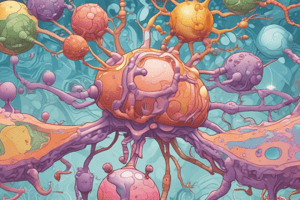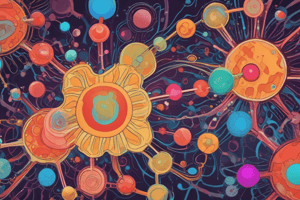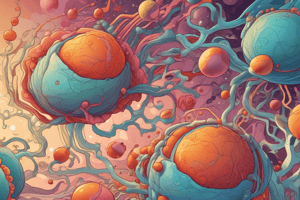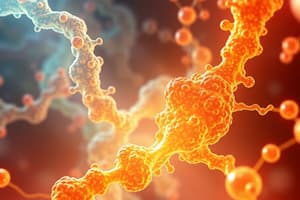Podcast
Questions and Answers
Które z poniższych nie jest jedną z fundamentalnych molekuł, które tworzą wszystkie komórki?
Które z poniższych nie jest jedną z fundamentalnych molekuł, które tworzą wszystkie komórki?
- Witaminy (correct)
- Węglowodany
- Tłuszcze
- Kwasy nukleinowe
Jakie funkcje pełnią lipidy w organizmach?
Jakie funkcje pełnią lipidy w organizmach?
- Magazynują energię, tworzą błony komórkowe i przekazują sygnały (correct)
- Są odpowiedzialne za przechowywanie informacji genetycznej
- Biorą udział w syntezie białek
- Uczestniczą w procesie oddychania komórkowego
Co to jest metabolizm w biologii?
Co to jest metabolizm w biologii?
- Reakcje prowadzące do powstawania materiału genetycznego
- Zespół reakcji chemicznych zachodzących w organizmie (correct)
- Proces podziału komórek
- Proces przekazywania informacji genetycznej
Jakie jest główne zadanie enzymów w organizmach żywych?
Jakie jest główne zadanie enzymów w organizmach żywych?
Co to jest catabolism w biologii?
Co to jest catabolism w biologii?
Co to jest anabolizm?
Co to jest anabolizm?
Co to jest dogma centralna biologii molekularnej?
Co to jest dogma centralna biologii molekularnej?
Co to jest synteza białek?
Co to jest synteza białek?
Czym jest inżynieria metaboliczna?
Czym jest inżynieria metaboliczna?
Czym jest sygnalizacja komórkowa?
Czym jest sygnalizacja komórkowa?
Study Notes
Exploring Chemistry: A Deep Dive into Biochemistry
Biochemistry — the study of chemical processes within living organisms — is a cornerstone of chemistry and life sciences. It strives to understand the intricate relationships between chemistry and biology, revealing how the chemical elements, compounds, and reactions drive life at all levels of complexity.
Cellular Molecules: The Building Blocks of Life
At the foundations of biochemistry, we encounter the fundamental molecules that make up all living cells:
- Carbohydrates: Essential energy sources and structural components, such as glucose, cellulose, and starch.
- Lipids: Fats and oils that function in energy storage, membrane formation, and signaling.
- Proteins: Complex molecules that serve diverse roles, including enzymatic catalysis, structural support, and communication between cells.
- Nucleic Acids: DNA and RNA, the molecules of heredity storing genetic information and facilitating gene expression.
The Chemistry of Life: Metabolism and Enzymes
Metabolism encompasses all the chemical reactions that occur within living organisms, from the breaking down of food to the building up of cellular structures. Two principal types of metabolism exist:
- Catabolism: The breaking down of complex molecules to release energy and produce simpler molecules, such as cellular respiration and glucose metabolism.
- Anabolism: The formation of complex molecules from simpler ones, such as protein synthesis and fatty acid synthesis.
Enzymes are biological catalysts that speed up chemical reactions, allowing life to operate at a pace that would otherwise be impossible. Enzymes are proteins that bind to specific substrates, lowering activation energies for reactions, and are essential to every aspect of metabolism.
The Central Dogma: DNA Replication, Transcription, and Translation
The central dogma of molecular biology describes the flow of genetic information from DNA to RNA and then to proteins.
- DNA replication: The process by which a single strand of DNA is copied to produce two identical double-stranded DNA molecules.
- Transcription: The synthesis of RNA molecules from DNA templates, guided by RNA polymerase enzymes. The RNA molecules produced are either messenger RNA (mRNA) or non-coding RNA (ncRNA).
- Translation: The process by which ribosomes use mRNA as a template to synthesize proteins from amino acids.
Cell Signaling and Gene Regulation
Cellular communication and gene regulation are vital processes in maintaining homeostasis and coordinating cellular responses.
- Cell signaling: A system that allows cells to communicate with each other by transmitting chemical signals across membranes.
- Gene regulation: The process by which the expression of specific genes is controlled in response to various internal and external signals.
A Deeper Look at Biochemistry
Biochemistry continues to uncover new insights into the molecular machinery of life, with some recent areas of focus including:
- Metabolic engineering: Designing and optimizing metabolic pathways for the production of valuable chemicals, drugs, and fuels.
- Proteomics: The study of proteins and their interactions, including protein folding, modification, and function.
- Epigenetics: The study of heritable changes in gene expression that do not involve alterations to the DNA sequence.
With its roots in chemistry and its branches extending into biology, biochemistry offers a comprehensive understanding of living organisms. By studying the molecules, reactions, and mechanisms that underpin life, biochemistry sheds light on the intricate dance of chemistry and biology that is the foundation of life on Earth.
Studying That Suits You
Use AI to generate personalized quizzes and flashcards to suit your learning preferences.
Description
Dive into the world of biochemistry, exploring the fundamental molecules of life, the chemistry of metabolism and enzymes, the central dogma of molecular biology, cell signaling, gene regulation, and emerging areas like metabolic engineering and epigenetics.





